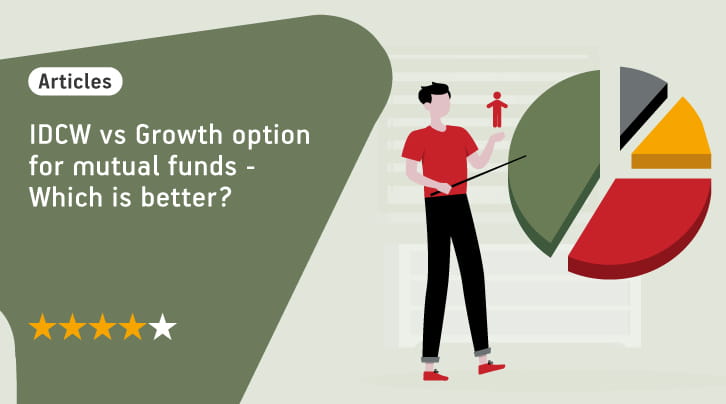Choosing Between IDCW and Growth? Here’s What You Need to Know
Mutual funds come in different options, and it's important to understand the differences between them before investing. One such option is the IDCW (Income Distribution cum Capital Withdrawal) option, and the other is the growth option. Many investors are confused about which option to choose as both offer different advantages. So, let’s explore the difference between Growth and IDCW.
What is the Growth option?
The growth option in investments is a choice where the profits made by your investment are reinvested back into the fund rather than distributed as IDCW (formerly called dividends). Instead of receiving regular payouts, any gains are automatically used to purchase more units of the investment.
This helps compound your returns over time, potentially leading to higher overall growth. For example, consider investing Rs. 1,000 in a mutual fund with the Growth option. In the first year, the fund gains 10%, increasing your investment to Rs. 1,100.
Instead of distributing this profit as income, the Growth option automatically reinvests it. The second year sees an 8% gain, making your investment Rs. 1,188. This compounding effect continues, with each year's profits reinvested. After several years, your initial Rs. 1,000 may grow substantially. The growth option is like a snowball, allowing your investment to potentially accumulate more significant returns over time through the power of compounding.
What is the IDCW option?
The IDCW (Income Distribution Cum Capital Withdrawal), also known as the dividend option in the past in Mutual Fund investments, provides regular income payouts to investors. Unlike the growth option, where profits are reinvested, IDCW pays out a combination of income and a portion of the invested capital.
The income could be in the form of dividends, interest, or any earnings the investment generates. This option is suitable for those seeking a regular income stream, offering a way to enjoy the benefits of their investment during the investment period rather than waiting until the end.
What is the difference between IDCW vs Growth in MF?
Feature |
IDCW Option |
Growth Option |
Income Distribution |
Provides regular income payouts to investors.
(IDCW is subject to the availability of distributable surplus as computed in accordance with SEBI Regulations. IDCW) |
Does not provide regular income; profits are reinvested for potential capital growth. |
Capital Withdrawal |
Allows withdrawals from both income and invested capital.
(the amounts can be distributed out of investors capital (Equalization Reserve), which is part of sale price that represents realized gains) |
Typically, it does not allow regular withdrawals; capital gains remain invested for potential growth. |
Compounding Effect |
The capital portion is gradually reduced as withdrawals are made, potentially impacting overall compounding. |
Profits are reinvested, contributing to compounding and potential higher growth over time. |
Investor Profile |
Suited for investors seeking regular income streams, such as retirees or those looking for periodic payouts. |
Suitable for investors with a long-term horizon, aiming for capital appreciation and willing to forgo regular income. |
Risk and Return |
Generally, the risk may be lower as regular payouts offer a more stable income. Returns are a combination of income and capital appreciation. |
Potentially higher risk as the focus is on capital growth, and returns depend on market performance. |
Tax Implications |
Tax implications may vary based on the nature of income distributions and withdrawals. Investors may be taxed on both income and capital gains. |
Tax implications typically arise when units are sold, triggering capital gains tax. Reinvested profits may also be subject to tax when redeemed. |
IDCW vs Growth - Which one should you choose for your investment portfolio?
Choosing between IDCW and Growth options depends on your financial goals and preferences. Suppose you seek regular income and are looking for steady payouts. In that case, IDCW is suitable, making it ideal for retirees or those who need periodic income.
However, the Growth option may be better if you focus on long-term wealth accumulation and let your money grow without regular payouts. It's like deciding between receiving a paycheck regularly (IDCW) or allowing your savings to compound and potentially grow more significantly over time (Growth).
In addition, for best results, consider your current financial needs, risk tolerance, and long-term objectives to determine which option aligns better with your investment strategy.
Is it possible to switch from the Growth option to IDCW?
Yes, it is possible to switch from the Growth option to the IDCW (Income Distribution Cum Capital Withdrawal) option in mutual funds. This process is commonly known as a switch transaction. However, the ability to switch between options may depend on the terms and conditions set by the mutual fund scheme and the fund house managing it.
Investors usually have the flexibility to make such switches based on their changing financial needs and investment objectives. It's advisable to contact the financial advisor to inquire about the procedures, potential costs, and any associated implications before making such a switch. Remember that switching may have tax implications and could impact your investment strategy, so making strategic decisions based on your financial situation and goals is essential.
The Bottom Line
The difference between IDCW and Growth options depends on your financial goals. If you need a regular income stream, especially if you're retired, IDCW might be better.
However, the Growth option may suit you if you're focused on long-term growth and are comfortable without regular payouts. It's like deciding whether you want a steady paycheck (IDCW) or prefer your savings to grow and potentially yield higher returns over time (Growth). Consider your specific needs and financial plans to determine which option aligns better with your investment objectives.
Mutual Fund investments are subject to market risks, read all scheme related documents carefully.





 1800-270-7000
1800-270-7000




